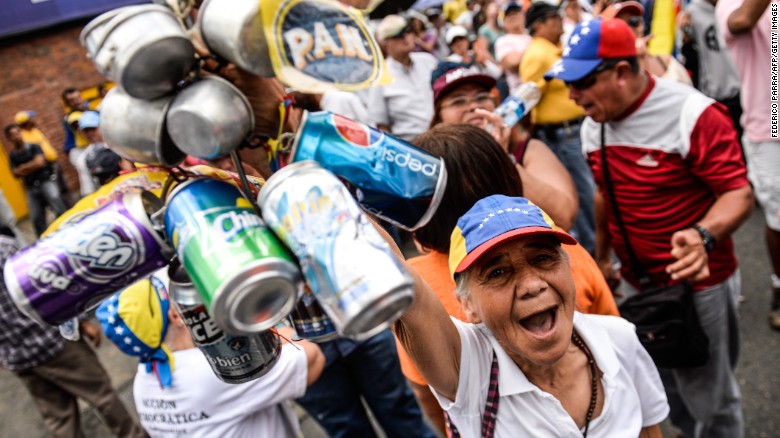Venezuela's disastrous course
For a fleeting few years the South American nation of Venezuela and its histrionic late President Hugo Chavez made waves on the global stage. While he upended the country's economy and exploited class conflict at home, he blamed the world's woes on the U.S., insulted the American president at the United Nations, and exhorted other leftists in the region to challenge the prevailing economic model and follow his path to "21st century socialism."

Frida Ghitis
Since Chavez died, the world mostly stopped paying attention. That, however, may soon change.
The stage is now set for what could become a major confrontation. Underpressure from a jailed opposition leader on hunger strike, the government finally set an election date. On December 6, Venezuelans will go to the polls to elect a new National Assembly. The stakes are enormous, and the possibility of serious turmoil is very real.
President Nicolas Maduro, Chavez's hand-picked successor, already warned that if the opposition wins, "very grave things will occur," saying a "process of confrontation" will be unleashed, vowing he will be first to take to streets to "defend the revolution."
When opposition candidates started trying to register for the election last week, they discovered that election authorities, loyal to the government, were already barring them from running for office. And the judiciary system will offer no relief.
As international human rights groups just reiterated, the justice system is nothing but a tool against government critics and rivals, with judges and prosecutors obediently serving the President's political objectives.
Still, the opposition is looking forward to winning this election as popular frustration with increasingly dire economic and security conditions turn a growing number of people against the regime. A significant number of Venezuelans, perhaps 25%,remains loyal to the legacy of the charismatic Chavez. But there is a very good chance that the opposition will try to launch a recall campaign against the hapless Maduro.
The ingredients for a crisis are in place: Anger, frustration, visceral enmity between two camps and a sense of unfair play. The only way to prevent a greater disaster is making sure that fair elections take place, opening a peaceful path, a political avenue for working across the country's deep divide.
But the prospects do not look good. The Venezuelan people have endured a catastrophic economic collapse that is sure to grow worse in the months ahead. If someone had set out to destroy the country they could hardly have done it more effectively than Chavez and his chosen heir, who has followed the same disastrous policies, driving the country into the abyss.
Venezuela has the world's largest oil reserves, but the country is essentially bankrupt.Last November it started importing, of all things, oil. There are shortages of practically every conceivable consumer product, from toilet paper to beer, from milk to antibiotics.
A shopping expedition is an exercise in frustration and endurance. Venezuelans have to stand in line for hours in the stifling tropical heat in pursuit of products that are more often than not completely out of stock.
As his predecessor did, Maduro blames the shortages on the opposition, on his political enemies, and on the rich. But the real reason why the economy is simply not functioning is that the government has introduced wrong-headed policies that defy all logic.
What started as an effort to alleviate poverty -- the most worthy of goals in a poor country -- turned into a failed experiment in populist-infused socialism. The government expropriated businesses, tried to control prices and markets, and generally disrupted the mechanisms of supply and demand to the point where producing anything became unprofitable.
The first and biggest target of government intervention was the state-owned oil company, PDVSA, which was used by the Chavez government as a funding source for social programs.
What was once an efficient, profitable, well-run business became a political tool run by party loyalists. Instead of investing in maintenance and production, the government wrung out all it could from its oil firm, using cheap oil to buy the loyalty of Latin American regimes, and using the profits to finance a multitude of unrelated projects.
If done with more foresight it might have worked, but in the end it all came crashing down. This all started during the years when oil prices spiked above $100 a barrel, bringing oceans of money, none of which was used to expand production and maintain equipment. The government broke the piggy bank.
Oil production has collapsed. And, making matters worse, much worse, the world price of oil, the lifeblood of the regime and the country, has fallen by about half. The country's cash flow problems were already serious before oil prices swooned. They will only get worse now.
In a desperate effort to hold on to scarce dollars, the government has imposed a dizzying system of currency controls, with four different exchange rates. In 2003, the official rate stood at 1.6 Bolivars per dollar. A year ago the rate stood at 79 per dollar. Today you can get about 700 bolivars for a dollar on the black market.
The government also helped itself to the nation's hard currency reserves, using what is meant to be saved as the economic ballast to fund social programs. Now those reserves stand at record lows and the economy is about to crash into a wall.
The inflation rate is so high that authorities have stopped reporting the latest statistics. The last official report last year put it at 68%, but economists say it's now well into triple digits. The economy is in a deep recession. Again, no official figures are available.
What makes the situation truly perilous is the political polarization that Chavez and Maduro stoked with such gusto. The country is divided into two camps that despise each other. The depth of animosity makes divisions in Washington seem tame. For every problem, for every shortage, for every crime, for every failed policy, Maduro blames the opposition; he accuses businesses of hoarding and speculating to destroy his government.
Venezuela will make headlines in the coming months. If a total collapse ensues, the repercussions will be felt throughout the region and the hemisphere. The only way to prevent it is for the international community to demand fair elections. Maduro has already rejected international observers, saying, "Venezuela is not and will not be monitored by anyone." But there is still a way to prevent disaster if Maduro can be convinced to let democracy take its course.
News Courtesy: www.cnn.com











